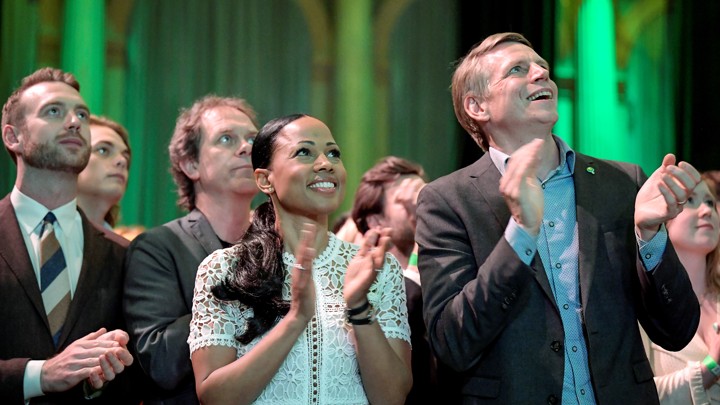
Smaller, pro-EU parties made large gains. Far-right nationalists won too, but less than expected.
European elections are typically treated as second-tier contests, in which few turn out to vote. Those who do tend to be driven by domestic issues and often opt to support smaller parties at the expense of established ones. This year, though, was different. Not only did an estimated 51 percent of the bloc’s 400 million eligible voters cast a ballot (a 20-year high, according to the European Parliament), but they did so in a campaign virtually dominated not by domestic issues, but by the EU and its future. Perhaps nowhere was this more evident than in Germany, where nearly all of the major parties (excluding the far-right Alternative for Germany) focused their campaign on their own vision for the bloc.
“These elections are really about sending a signal—do you want to develop the European Union further, or do you want to fall back to nationalism?” Svenja Hahn, a German MEP-elect for the pro-business Free Democratic Party, which increased its vote share by two seats, told me on her final day of campaigning, at a street fair in the northern-Germany city of Hamburg. She and her fellow Free Democratic Party members waved EU flags and held a large banner urging German voters to “Sag JA zu Europa,” or “Say YES to Europe.”
Even in Britain, which wasn’t expected to take part in these EU elections, the topic of Europe—and specifically Brexit—dominated the campaign. Though the nascent Brexit Party, which advocates for Britain leaving the EU without a withdrawal deal, performed the best, with 31.7 percent of the vote, pro-EU parties such as the Liberal Democrats and the Greens also made substantial gains. The outcome reflects deep divisions that already existed within Britain over Brexit: The five unequivocally pro-EU parties (including the Liberal Democrats, the Greens, the Scottish National Party, Change U.K., and Plaid Cymru) earned a collective 40 percent of the vote, compared with the combined 35 percent earned by the unequivocally euroskeptic Brexit Party and U.K. Independence Party.
To the extent that there was a wave of support for any one particular party across the EU, it was almost certainly for the Greens. Europe’s Green parties saw major gains in Germany and France, as well as upswings in Ireland, Luxembourg, and Portugal. “There has been a lot of talk about the far right and not so much talk about the Greens,” Sofi Lindholm, a 29-year-old voter, told me, noting the success of the Green Party in her native Finland. “The central party lost one seat and the Greens gained one, so it was a good sign for the planet, for the climate.”
For others awaiting the election results in the plaza outside the European Parliament on Sunday, the results were a victory for Europhiles everywhere—regardless of which party they voted for. “It’s a nice sign that people felt concerned about voting for Europe and people feel more European than previous elections,” Piero Delucia, a 36-year-old voter from Italy, told me of the turnout as he and his friends from the U.K. and Finland awaited the live election returns in the rain.
“This, for me, is already a success.”
The Friedrich Ebert Foundation (Friedrich-Ebert-Stiftung) arranged to support travel and accommodations in the European Union for reporting used in this article.
We want to hear what you think about this article. Submit a letter to the editor or write to [email protected].





